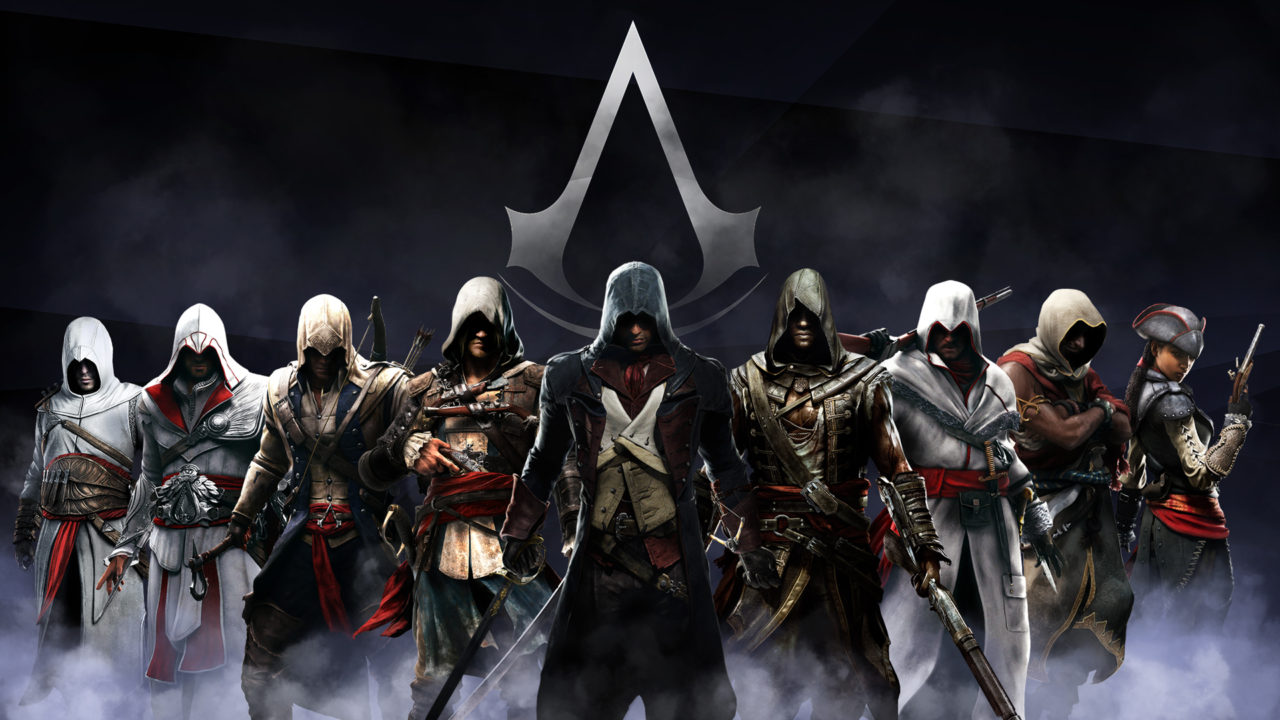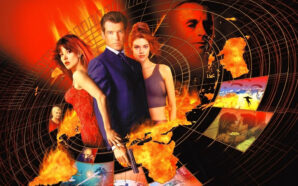After putting over 100 hours into Assassin’s Creed Origins and its DLC over the past year, I was hoping for some time off. There’re loads of games out there that I haven’t played and annualisation ultimately damaged the Assassin’s Creed brand so I wished that the next game wouldn’t be released until 2019. But then earlier this year Assassin’s Creed Odyssey was announced with a 2018 release date and I soon changed my tune. I can’t help but get excited for a new Assassin’s Creed game, the series being my favourite in the current gaming landscape. Odyssey looks to draw on Origins’ gameplay and move the action even further back in time with added emphasis on the RPG elements. Now that we’re merely a week away from it’s release, I’ve been thinking a lot about the past of the franchise now that it is over a decade old and has shaped my gaming habits for just as long. Below is my personal ranking of every major Assassin’s Creed game released and I can’t wait to find out where Odyssey will ultimately land in the coming weeks.
10 – Assassin’s Creed Unity (2014)
 I know Unity is the common and cheap answer to what the worst Assassin’s Creed game is but there’s a reason for that: it’s the worst Assassin’s Creed game. The city of Paris is impeccably designed and stunningly beautiful but for some reason it wasn’t fun to explore and, after the sprawl of the Caribbean Sea in Black Flag, it seemed like a step backwards. I used to play the Assassin Creed games almost exclusively, finishing a game and then immediately starting my next playthrough, collecting every collectable multiple times, but Unity was a struggle to complete just once. And I didn’t even run into any of the infamous technical issues. The plot was boring, the characters fell flat and the lore I had become so invested in was pushed to the side-lines. The game is beautiful on the outside but shallow within. I do like the stealth system and the introduction of large, open assassination missions that can be tackled a variety of ways, but in the end that’s not enough to save the worst game in the series. Unity is the franchise treading water with little to add, no doubt a symptom of annualisation (in fact two games were released this year) and is my least favourite game of the series.
I know Unity is the common and cheap answer to what the worst Assassin’s Creed game is but there’s a reason for that: it’s the worst Assassin’s Creed game. The city of Paris is impeccably designed and stunningly beautiful but for some reason it wasn’t fun to explore and, after the sprawl of the Caribbean Sea in Black Flag, it seemed like a step backwards. I used to play the Assassin Creed games almost exclusively, finishing a game and then immediately starting my next playthrough, collecting every collectable multiple times, but Unity was a struggle to complete just once. And I didn’t even run into any of the infamous technical issues. The plot was boring, the characters fell flat and the lore I had become so invested in was pushed to the side-lines. The game is beautiful on the outside but shallow within. I do like the stealth system and the introduction of large, open assassination missions that can be tackled a variety of ways, but in the end that’s not enough to save the worst game in the series. Unity is the franchise treading water with little to add, no doubt a symptom of annualisation (in fact two games were released this year) and is my least favourite game of the series.
9 – Assassin’s Creed (2007)
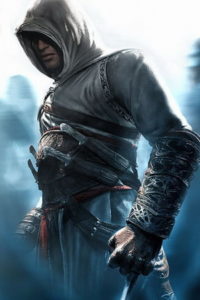 I love the first entry in the Assassin’s Creed series, the game that started it all, but compared to the innovation and expansion that came after, it’s a lesser entry in the franchise. All the features are here, from the free-running to the skewed-history, and the game introduced us to the hallmarks of the story going forward: Assassins, the Creed, Templars, the Animus, Abstergo and the Pieces of Eden. The mass introduction of lore doesn’t disguise the fact that the narrative is bare-bones: travel to this city, gather information on your target (by completing the same three missions over and over) and then assassinate your target. Rinse and repeat. Looking back the first Assassin’s Creed feels like the first Star Wars movie. It introduces us to the AC universe via a simplistic plot and some world-building, letting us get to know the characters and rules before expanding into the franchise we know and love in the sequel. It’s a great starting point for the series but, after the expansion and growth since, that’s all it can be viewed as.
I love the first entry in the Assassin’s Creed series, the game that started it all, but compared to the innovation and expansion that came after, it’s a lesser entry in the franchise. All the features are here, from the free-running to the skewed-history, and the game introduced us to the hallmarks of the story going forward: Assassins, the Creed, Templars, the Animus, Abstergo and the Pieces of Eden. The mass introduction of lore doesn’t disguise the fact that the narrative is bare-bones: travel to this city, gather information on your target (by completing the same three missions over and over) and then assassinate your target. Rinse and repeat. Looking back the first Assassin’s Creed feels like the first Star Wars movie. It introduces us to the AC universe via a simplistic plot and some world-building, letting us get to know the characters and rules before expanding into the franchise we know and love in the sequel. It’s a great starting point for the series but, after the expansion and growth since, that’s all it can be viewed as.
8 – Assassin’s Creed Syndicate (2015)
 After my disappointment with Unity, Syndicate was the first Assassin’s Creed game I didn’t pick up at launch. But after playing it I wish I did. The gameplay systems pioneered in Unity return in an improved way and while Paris was pretty but dull to play in, London looks fantastic and is fun to explore whether on a horse-and-cart or using the new grapnel/zipline feature. At times it feels similarly shallow to Unity but even when I was just running around completing easy missions and finding collectables, I was having fun. London really is the star of the game and its districts and key locations are easily distinguishable and home to more of the open mission design. Jacob and Evie Frye are gratifying characters, representing the two halves of Assassin’s Creed combat: stealth and guns-blazing, and even the two halves of the Assassin’s Creed fanbase with one caring about the Brotherhood and the lore and the other who just wants to fight and blow stuff up. The big negative is how the story plays out, with lacklustre villains who are eliminated to piss off the main antagonist who we rarely see until the very disappointing final confrontation. To be honest I’m having trouble writing about Syndicate; the game was fine and fun enough to complete but most of it was entirely forgettable and the present-day sequences, like Unity, are a joke. They either have to be significant or be cast from the franchise all together. Short cutscenes and audio logs just annoy old fans and uninterest new fans.
After my disappointment with Unity, Syndicate was the first Assassin’s Creed game I didn’t pick up at launch. But after playing it I wish I did. The gameplay systems pioneered in Unity return in an improved way and while Paris was pretty but dull to play in, London looks fantastic and is fun to explore whether on a horse-and-cart or using the new grapnel/zipline feature. At times it feels similarly shallow to Unity but even when I was just running around completing easy missions and finding collectables, I was having fun. London really is the star of the game and its districts and key locations are easily distinguishable and home to more of the open mission design. Jacob and Evie Frye are gratifying characters, representing the two halves of Assassin’s Creed combat: stealth and guns-blazing, and even the two halves of the Assassin’s Creed fanbase with one caring about the Brotherhood and the lore and the other who just wants to fight and blow stuff up. The big negative is how the story plays out, with lacklustre villains who are eliminated to piss off the main antagonist who we rarely see until the very disappointing final confrontation. To be honest I’m having trouble writing about Syndicate; the game was fine and fun enough to complete but most of it was entirely forgettable and the present-day sequences, like Unity, are a joke. They either have to be significant or be cast from the franchise all together. Short cutscenes and audio logs just annoy old fans and uninterest new fans.
7 – Assassin’s Creed Rogue (2014)
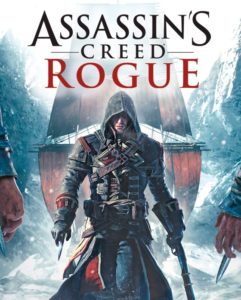 Rogue was a difficult game to plant on this list. Coming out on previous generation consoles the same year as Unity, it featured more of the same gameplay as the previous few games in the series and offered nothing new. This lack of progress is its biggest failure in terms of gameplay but its biggest success in terms of characters. The game is a delight for a huge Assassin’s Creed fan like me because of the sheer number of returning characters and the way it fills in the gaps left by previous instalments. This fan service would be lost on a newcomer but for me it makes the game. Yet its defining feature is something brand new to the series. Characters, locations and a lot of the story are familiar but what’s new is that protagonist Shay begins the game as an Assassin but soon becomes a Templar. The game navigates the ideology of the two sides with ease, bringing something fresh to the series, and changing the way I had interpreted everything in the previous games. Assassins are good guys and Templars are the baddies was the status quo but Rogue takes a more jaded look at the shades of grey between them and changes our perceptions of the two organisations which following games will continue, making it a turning point of the series. Rogue is the hidden gem of the series but the lack of gameplay refinements and disappointingly short narrative hold it back.
Rogue was a difficult game to plant on this list. Coming out on previous generation consoles the same year as Unity, it featured more of the same gameplay as the previous few games in the series and offered nothing new. This lack of progress is its biggest failure in terms of gameplay but its biggest success in terms of characters. The game is a delight for a huge Assassin’s Creed fan like me because of the sheer number of returning characters and the way it fills in the gaps left by previous instalments. This fan service would be lost on a newcomer but for me it makes the game. Yet its defining feature is something brand new to the series. Characters, locations and a lot of the story are familiar but what’s new is that protagonist Shay begins the game as an Assassin but soon becomes a Templar. The game navigates the ideology of the two sides with ease, bringing something fresh to the series, and changing the way I had interpreted everything in the previous games. Assassins are good guys and Templars are the baddies was the status quo but Rogue takes a more jaded look at the shades of grey between them and changes our perceptions of the two organisations which following games will continue, making it a turning point of the series. Rogue is the hidden gem of the series but the lack of gameplay refinements and disappointingly short narrative hold it back.
6 – Assassin’s Creed: Revelations (2011)
 I feel like the level of enjoyment the gamer gets from Revelations is equal to the level of investment they have in Ezio’s story up to this point. The final game in Ezio’s trilogy takes place in 1511 Constantinople and while the city, villains and gameplay are far from the best in the franchise, I love the focus on Ezio’s character. He’s aging now, still lethal but most definitely hurting, and the narrative sends him on a quest of self-actualisation as he finally understands his place in the universe. At the end he finds love in Sofia and retires in a way that brings aching melancholy to the franchise that will emotionally affect you if you have invested time in the previous two games. It’s not the best game to begin exploring the franchise but for fans it feels worth it for the journey despite at times feeling like a placeholder title in the franchise. Altair also gets a send off and, even though you can continue playing after the credits roll, there’s a palpable sense of finality that you don’t often see from the series. Revelations also features my favourite version of the franchise’s multiplayer mode and the one I spent the most time playing.
I feel like the level of enjoyment the gamer gets from Revelations is equal to the level of investment they have in Ezio’s story up to this point. The final game in Ezio’s trilogy takes place in 1511 Constantinople and while the city, villains and gameplay are far from the best in the franchise, I love the focus on Ezio’s character. He’s aging now, still lethal but most definitely hurting, and the narrative sends him on a quest of self-actualisation as he finally understands his place in the universe. At the end he finds love in Sofia and retires in a way that brings aching melancholy to the franchise that will emotionally affect you if you have invested time in the previous two games. It’s not the best game to begin exploring the franchise but for fans it feels worth it for the journey despite at times feeling like a placeholder title in the franchise. Altair also gets a send off and, even though you can continue playing after the credits roll, there’s a palpable sense of finality that you don’t often see from the series. Revelations also features my favourite version of the franchise’s multiplayer mode and the one I spent the most time playing.
5 – Assassin’s Creed: Brotherhood (2010)
 Due no doubt to the introduction of an annual release date, Assassin’s Creed: Brotherhood felt like the smallest AC game to date. Smaller doesn’t always mean worse of course but Brotherhood failed to live up to the epic proportions of Assassin’s Creed II. But any game that has to follow Assassin’s Creed II will look weak by comparison and Brotherhood has enough strengths to be a solid instalment in the franchise. Rome ranks among the series’ best cities despite its size and I spent many hours upon its rooftops taking in the atmosphere of the game, which is lacking from several other entries in the franchise and aided here by the incredible music. Gameplay was refined with chain kills, crossbows and the ability to recruit civilians to your cause. After the decades-spanning Assassin’s Creed II, it’s amazing how much character development for Ezio comes from this game and he has great antagonists to face. I must mention the prologue too which is one of my favourite hours in Assassin’s Creed history. Seeing Ezio think his life as a killer is over is a profound change of pace before violence erupts as our home base from the last game is destroyed in a huge invasion by the Borgia in an action sequence of a scale never seen before. As a fan of the present-day narrative I enjoyed expanding Desmond’s role and the bold, weird ending of the game and the newly introduced multiplayer mode was a lot of fun.
Due no doubt to the introduction of an annual release date, Assassin’s Creed: Brotherhood felt like the smallest AC game to date. Smaller doesn’t always mean worse of course but Brotherhood failed to live up to the epic proportions of Assassin’s Creed II. But any game that has to follow Assassin’s Creed II will look weak by comparison and Brotherhood has enough strengths to be a solid instalment in the franchise. Rome ranks among the series’ best cities despite its size and I spent many hours upon its rooftops taking in the atmosphere of the game, which is lacking from several other entries in the franchise and aided here by the incredible music. Gameplay was refined with chain kills, crossbows and the ability to recruit civilians to your cause. After the decades-spanning Assassin’s Creed II, it’s amazing how much character development for Ezio comes from this game and he has great antagonists to face. I must mention the prologue too which is one of my favourite hours in Assassin’s Creed history. Seeing Ezio think his life as a killer is over is a profound change of pace before violence erupts as our home base from the last game is destroyed in a huge invasion by the Borgia in an action sequence of a scale never seen before. As a fan of the present-day narrative I enjoyed expanding Desmond’s role and the bold, weird ending of the game and the newly introduced multiplayer mode was a lot of fun.
4 – Assassin’s Creed Origins (2017)
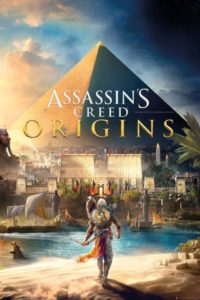 Last year’s Assassin’s Creed Origins started a new era of the franchise. RPG elements, an addictive loot system and truly massive open world that makes the rest of the series look tiny in comparison. It is by far the best-looking AC game, from oasis to desert, and made my upgrade to 4K with the PS4 Pro pay off. Going backwards in time was a great decision at this stage in the franchise, allowing new gamers to have a good jumping off point and going back to the prominence of swords and other melee weapons was vital, instead of trying to figure out which hidden blade gimmick to come up with next. The story is okay and, I admit, a little disappointing compared to everything else. Bayek and Aya (and present-day Layla) are fascinating characters but the story is rushed. We get several missions early on and then suddenly the player accepts a mission which turns out to be several hours long, condensing the rest of the plot into a bizarre linear experience, and wraps up everything far too quickly. But with Origins gameplay is key and it’s a blast to play, from climbing pyramids, levelling up your character, exploring tombs or taking out Far Cry-esque military camps. Most of the problems I have with the game are washed away because of how fun it is to play and Origins is the perfect springboard for more games in the series to base themselves off, just like Odyssey is doing.
Last year’s Assassin’s Creed Origins started a new era of the franchise. RPG elements, an addictive loot system and truly massive open world that makes the rest of the series look tiny in comparison. It is by far the best-looking AC game, from oasis to desert, and made my upgrade to 4K with the PS4 Pro pay off. Going backwards in time was a great decision at this stage in the franchise, allowing new gamers to have a good jumping off point and going back to the prominence of swords and other melee weapons was vital, instead of trying to figure out which hidden blade gimmick to come up with next. The story is okay and, I admit, a little disappointing compared to everything else. Bayek and Aya (and present-day Layla) are fascinating characters but the story is rushed. We get several missions early on and then suddenly the player accepts a mission which turns out to be several hours long, condensing the rest of the plot into a bizarre linear experience, and wraps up everything far too quickly. But with Origins gameplay is key and it’s a blast to play, from climbing pyramids, levelling up your character, exploring tombs or taking out Far Cry-esque military camps. Most of the problems I have with the game are washed away because of how fun it is to play and Origins is the perfect springboard for more games in the series to base themselves off, just like Odyssey is doing.
3 – Assassin’s Creed III (2012)
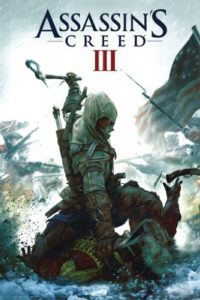 Assassin’s Creed III is a centre of controversy for gamers. As far as I can tell a lot of gamers don’t like it and find it slow and dull but most hardcore AC fans, me included, love the game. The game is slow but that is no bad thing. AC3’s narrative is one of my favourites of the franchise and begins with a hefty three-hour prologue in which we play as primary antagonist Haytham Kenway who arrives in North America and sets up a cell of the Templar Order. The villains of AC are often little more than undefined faceless masses of polygons and introducing them this way makes them seem like real characters. The rest of the campaign sees us play as Connor Kenway as he unravels the Templar’s plot with the American War of Independence as the backdrop, in which Connor becomes involved in many of the major events like an Assassin Forrest Gump. The game feels like an old-school historical epic complete with huge war scenes and character drama told over many years culminating in a low-key and well-executed final confrontation between hero and villain. The location feels unique and the changes to combat and new gameplay such as hunting, and the introduction of naval combat, define AC3 as a much more important game in the series than people realise. The present-day storyline comes to a head as we see Desmond finally become an Assassin and go on missions, including returning to the Abstergo facility where it all began back in the first game, one of the best moments in the series’ history. Assassin’s Creed III feels like the end of the first era of Assassin’s Creed and remains one of the best games in the franchise.
Assassin’s Creed III is a centre of controversy for gamers. As far as I can tell a lot of gamers don’t like it and find it slow and dull but most hardcore AC fans, me included, love the game. The game is slow but that is no bad thing. AC3’s narrative is one of my favourites of the franchise and begins with a hefty three-hour prologue in which we play as primary antagonist Haytham Kenway who arrives in North America and sets up a cell of the Templar Order. The villains of AC are often little more than undefined faceless masses of polygons and introducing them this way makes them seem like real characters. The rest of the campaign sees us play as Connor Kenway as he unravels the Templar’s plot with the American War of Independence as the backdrop, in which Connor becomes involved in many of the major events like an Assassin Forrest Gump. The game feels like an old-school historical epic complete with huge war scenes and character drama told over many years culminating in a low-key and well-executed final confrontation between hero and villain. The location feels unique and the changes to combat and new gameplay such as hunting, and the introduction of naval combat, define AC3 as a much more important game in the series than people realise. The present-day storyline comes to a head as we see Desmond finally become an Assassin and go on missions, including returning to the Abstergo facility where it all began back in the first game, one of the best moments in the series’ history. Assassin’s Creed III feels like the end of the first era of Assassin’s Creed and remains one of the best games in the franchise.
I’m very much looking forward to the remastered version of the game coming March 2019 along with a remastered version of Liberation (which I haven’t played)!
2 – Assassin’s Creed IV: Black Flag (2013)
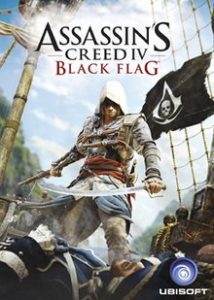 Out of all of the Assassin’s Creed games, Black Flag is probably the most fun. Building on the naval combat that was introduced in the previous instalment, Black Flag offers the huge open world of the Caribbean Sea to plunder and pillage on your way to becoming a feared pirate. Oh, and an Assassin. The actual Assassin stuff isn’t the focus and, while the game has all the familiar elements of Assassin’s Creed, whether it is gameplay or story points and lore, it doesn’t exactly feel like an Assassin’s Creed. That’s not necessarily a problem though because, like Origins, it’s a blast to play. While each of the previous games felt like sequels in a series, Black Flag does feel more standalone despite tying into the mythology, taking the series in an anthology-like direction. My favourite mission from the game, and one of my favourites of the series, comes when protagonist Edward is marooned on a desert island with fellow pirate Charles Vane, voiced by Finchy from The Office, who has gone mad. It’s a fun and unique mission in a series which often gets too bogged down in eavesdropping quests. Multiplayer returns for the last time which is a shame because it is one of the franchise’s most unique features; I hope it returns someday. There are moments when Black Flag hits the highest peaks of the series but, for me personally, it loses too much of the ‘Assassin’s Creed-ness’ while doing so for it to be my favourite.
Out of all of the Assassin’s Creed games, Black Flag is probably the most fun. Building on the naval combat that was introduced in the previous instalment, Black Flag offers the huge open world of the Caribbean Sea to plunder and pillage on your way to becoming a feared pirate. Oh, and an Assassin. The actual Assassin stuff isn’t the focus and, while the game has all the familiar elements of Assassin’s Creed, whether it is gameplay or story points and lore, it doesn’t exactly feel like an Assassin’s Creed. That’s not necessarily a problem though because, like Origins, it’s a blast to play. While each of the previous games felt like sequels in a series, Black Flag does feel more standalone despite tying into the mythology, taking the series in an anthology-like direction. My favourite mission from the game, and one of my favourites of the series, comes when protagonist Edward is marooned on a desert island with fellow pirate Charles Vane, voiced by Finchy from The Office, who has gone mad. It’s a fun and unique mission in a series which often gets too bogged down in eavesdropping quests. Multiplayer returns for the last time which is a shame because it is one of the franchise’s most unique features; I hope it returns someday. There are moments when Black Flag hits the highest peaks of the series but, for me personally, it loses too much of the ‘Assassin’s Creed-ness’ while doing so for it to be my favourite.
1 – Assassin’s Creed II (2009)
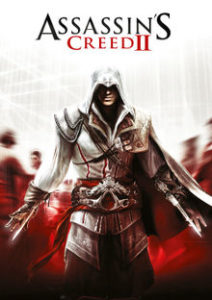 There is little to say about Assassin’s Creed II that hasn’t already been said. I agree with the consensus that the game is nothing short of a masterpiece and I claim it be my favourite video game of all time. Nowadays when something is described as “the Empire Strikes Back of the franchise” people are saying that it’s the dark middle chapter but Assassin’s Creed II is the Empire Strikes Back of the franchise in a different way. It takes absolutely everything that worked from the first instalment and improves upon it tenfold while adding a multitude of new features. Renaissance Italy is not your first thought of where to set an action game, but the location is my favourite in gaming and I know every rooftop and alley in the virtual Florence and Venice, as well as every delectable music cue of Jesper Kyd’s score. In the present-day, Desmond’s story continues and allows us to explore the vast mythology of the series which at this point in the franchise has become intriguing and not convoluted as it does later. Ezio is of course the true star of the game however, and while the story can be seen as a basic revenge plot, the characterisation that occurs over the decades from Ezio’s teen years to him becoming a tired and seasoned Assassin is perfect. From its heart-wrenching beginning to its mind-blowing ending, there is no hyperbole when discussing Assassin’s Creed II. It is gaming perfection.
There is little to say about Assassin’s Creed II that hasn’t already been said. I agree with the consensus that the game is nothing short of a masterpiece and I claim it be my favourite video game of all time. Nowadays when something is described as “the Empire Strikes Back of the franchise” people are saying that it’s the dark middle chapter but Assassin’s Creed II is the Empire Strikes Back of the franchise in a different way. It takes absolutely everything that worked from the first instalment and improves upon it tenfold while adding a multitude of new features. Renaissance Italy is not your first thought of where to set an action game, but the location is my favourite in gaming and I know every rooftop and alley in the virtual Florence and Venice, as well as every delectable music cue of Jesper Kyd’s score. In the present-day, Desmond’s story continues and allows us to explore the vast mythology of the series which at this point in the franchise has become intriguing and not convoluted as it does later. Ezio is of course the true star of the game however, and while the story can be seen as a basic revenge plot, the characterisation that occurs over the decades from Ezio’s teen years to him becoming a tired and seasoned Assassin is perfect. From its heart-wrenching beginning to its mind-blowing ending, there is no hyperbole when discussing Assassin’s Creed II. It is gaming perfection.
So, there is my personal ranking of the 10 core games of the Assassin’s Creed series. Just how wrong am I? Let me know in the comments and geek out with me about TV, movies and video-games on Twitter @kylebrrtt.




